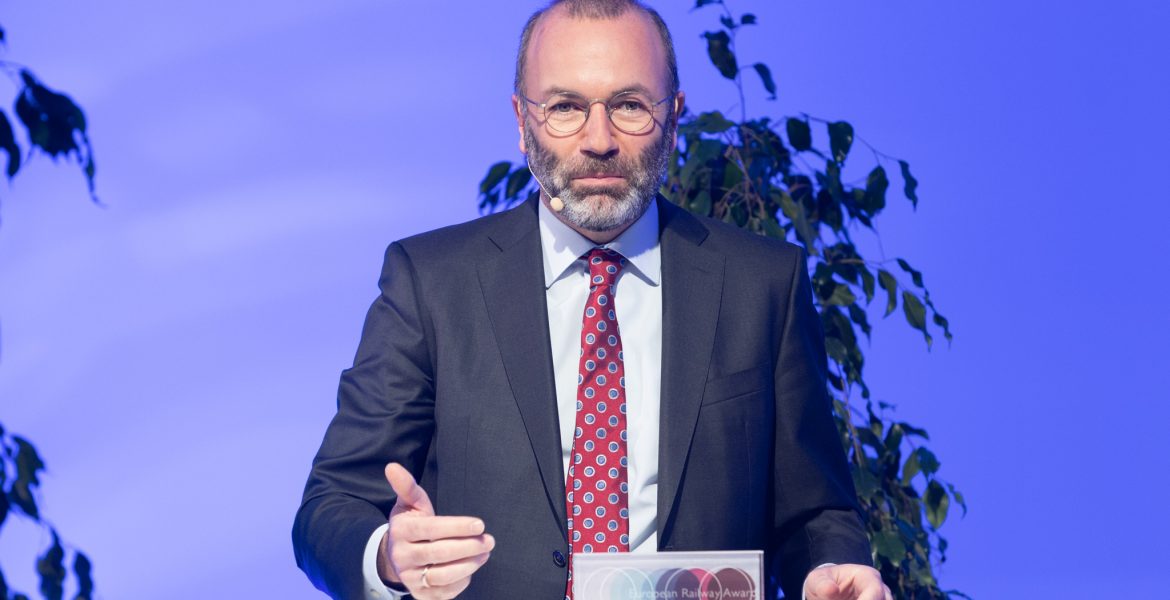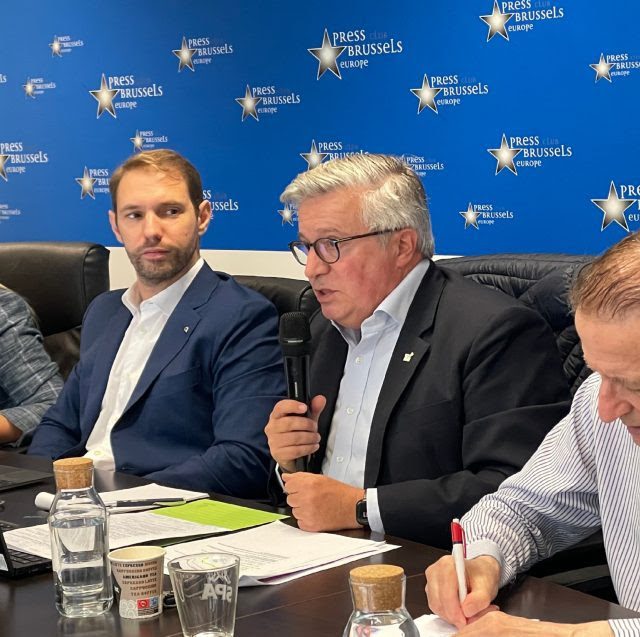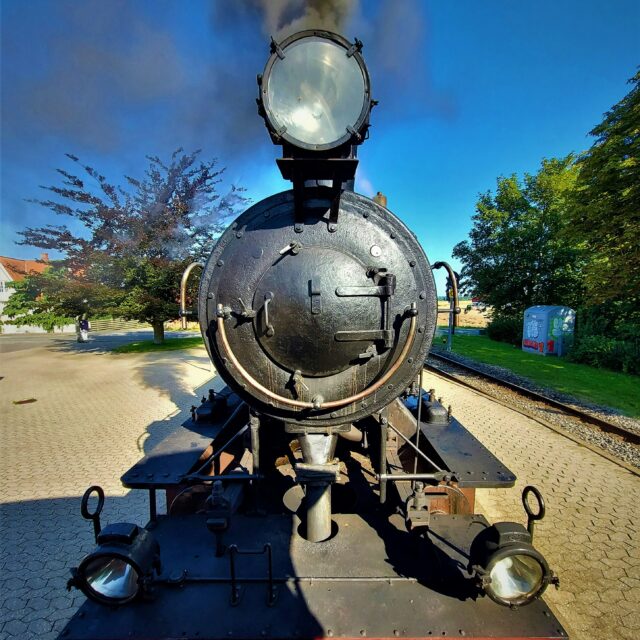The 2022 European Railway Award’s Rail Champion prize was presented today to Manfred Weber, Chairman of the European Parliament’s EPP Group, for his legislative support of rail travel among youth. Additionally, Bane NOR’s ERTMS programme was recognised as this year’s Rail Trailblazer project for revolutionising the Norwegian rail network and providing a vision for digital railways in a Single European Rail Area.The awards were bestowed during an online ceremony that celebrated 2021’s memorable European Year of Rail as it approaches its terminus.
Greeted by Philippe Citroën, UNIFE Director General, and Alberto Mazzola, CER Executive Director, viewers from across Europe tuned in for the 15th edition of the European Railway Award. The 2022 ceremony saw several new additions, such as the “Rail Champion” Award for outstanding political contributions to the advancement of rail transport and the “Rail Trailblazer” Award for technical excellence and innovation. The former was jointly bestowed as an honorary recognition by CER & UNIFE , while the latter was selected by a jury of policy makers and sector experts.
This event also saw the organisers award certificates of outstanding achievement to representatives of three major EU Year of Rail milestones: the flagship Connecting Europe Express initiative, the historic “Women in Rail” agreement signed between European rail social partners for the promotion and better protection of women employed in rail, and the Shift2Rail Joint Undertaking, Europe’s first public-private partnership in rail research & innovation that was launched in 2014 and is now succeeded by the new Europe’s Rail Joint Undertaking.
The Rail Champion Award went to EPP Leader MEP Manfred Weber for his inspiring dedication to the promotion of rail among Europe’s young people. He notably provided pivotal support to the DiscoverEU scheme, which has allowed thousands of young Europeans to travel through and engage with their neighboring EU countries in a sustainable way. Mr Weber’s achievements find particular resonance at this moment as Europe concludes the European Year of Rail and commences the European Year of Youth. Speaking live at the ceremony, Mr Weber said: “Rail travel is an essential part of our daily lives. Not only that, it can also be a life-changing experience to discover the beauty and diversity of Europe from a train. That is why I am so proud that we greatly increased the access to interrail for young people in Europe. We are grateful to all the people and organisations that have supported this idea, and we look forward to continue expanding this programme in the future!”
European Commissioner for Transport Adina Vălean was one of this year’s certificate of outstanding achievement recipients for her role in the Connecting Europe Express, a unique European Year of Rail project – initiated by the Commission and made possible by the voluntary contribution of over 40 rail partners – that took three iconic blue trains on a 20,000 km rail journey across the continent over a 36-day period. Between them the three Connecting Europe Express trains traversed 26 EU Member States and served as a poignant reminder of rail’s ability to connect our Union through discussions on rail and its future with sector stakeholders, politicians at all levels, the general public as well as schools.
At the ceremony’s roundtable discussion titled “Keeping rail a priority after the Year of Rail,” Commissioner Vălean gave her perspective: “With the European Year of Rail behind us, this year’s European Railway Award ceremony was a welcome opportunity to discuss how to keep the momentum it created. I congratulate and thank today’s winners for their outstanding work in this regard. For a real rail renaissance, we need to keep the spotlight firmly fixed on trains while tackling the shortcomings simultaneously. We will move forward with our new Action Plan at the EU level, transforming words into deeds. And the Recovery and Resilience Facility will invest €48.2 billion in modernising the sector: rail accounts for 52% of all transport-related reforms and investments. We will keep championing rail, and I count on our EU rail community to work with us to take down the last barriers and to create a single European Rail Area.”
Andrey Novakov, Member of the European Parliament and Chair of Rail Forum Europe, also took part in the debate and reflected that: “Rail means vision, rail means modernity. The Year of Rail played its role to set the basis for a long-term conversation about the importance of rail and its irreplaceable role as an effective and trusted transport mode in line with the EU’s long-term objective for a green and eco-friendly transport system. It is now our turn – politicians, experts and industry – to make the most out of it and to bring the ideas and vision into reality.”
Andreas Matthä, CER Chair and CEO of Austrian Federal railways ÖBB, took the opportunity to underline: “Last year, the Connecting Europe Express was the symbol of European cooperation and a concrete success story during the European Year of Rail. But the project also made it clear that we still have too many barriers for cross-border rail passenger and rail freight traffic. We have to solve the challenges together and invest in rail digitisation and expansion across Europe. We need fair competitive conditions with favorable track access charges for cross-border passenger transport and exemption from VAT for international rail tickets. Only by improving conditions can additional rail services, such as new international night train lines, be realised.”
Revealed live at the ceremony, the 2022 Rail Trailblazer Award went to Bane NOR’s ERTMS programme. The Norwegian national rail infrastructure company’s plan is to revolutionise its railway network over the next ten years by investing more than €2 billion in the European Rail Traffic Management System (ERTMS), which promises to enable future digitalisation and automation. It is the first project of this scale in Europe, with around 4,200 kilometres of track and more than 350 stations around Norway slated to be equipped with European Train Control System (ETCS) Level 2 technology.
Due to run until 2034, with a first ERTMS line set to open in October of this year, the programme implementation is ongoing, and several important milestones have already been reached. Perhaps most significantly, BANE Nor has already launched an ERTMS pilot line and a training and simulation centre. Workforce training is an important aspect of the project as an estimated 6,000 people will require ERTMS training to fully make use of this important technology. The new, fully digitalised signalling system will enhance safety, punctuality and capacity across Norway’s rail network. It also promises to save a significant amount of hardware and provide the basis for data-based, minimised preventive maintenance. For passengers, it will ultimately allow for a far more efficient and reliable travel experience, with similar benefits for the transport of goods.
Sverre Kjenne, Chief Operating Officer at Bane NOR, was present to collect the Award as a key driver of this monumental project. To mark the occasion, he stated: “We are extremely proud to receive this award! It shows that our work with ERTMS is of great importance also outside our own borders. We believe in the initiative to build one modern and common signalling system in one data center for the entire country. This award gives us renewed motivation to complete this great ambition. Together with our suppliers: Siemens, Alstom and Thales, we will deliver a new, efficient signalling system in the years to come. Starting with our first big milestones this year when we open the first modernised train line – Nordlandsbanen – in October. ERTMS will contribute to a more punctual, safe and environmentally-friendly railway in Norway.”




